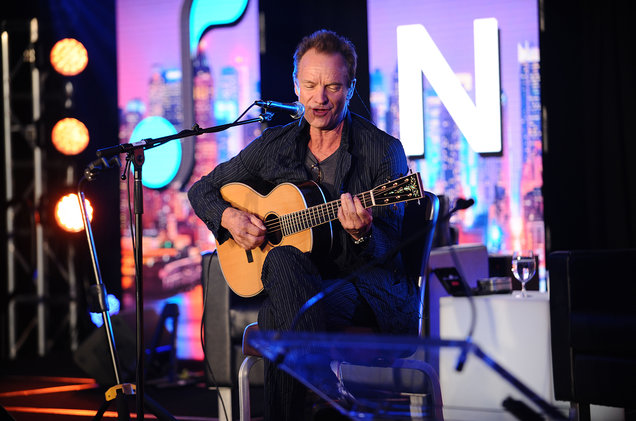Media
Billboard: At Annual Mtg, Music Publishers Lament ‘Criminal’ Returns From Digital Services

At the National Music Publishers' Association's annual meeting, Irving Azoff and other speakers urged the industry to pull together to fight for fair compensation from digital music service providers. Music publishers and songwriters were repeatedly urged to take their case to the court of public opinion where, it was noted, they could not lose. However, speakers also were notably worried about the U.S. Dept. of Justice's (DoJ) review of the consent decree, which may result in the DoJ enforcing 100 percent licensing, whereby any rights owner for a song would license the entire song, not just his or her share, to licensees. For example, during the keynote Q&A interview conducted by NMPA president/CEODavid Israelite, Azoff noted that he had arranged a conference call with the DoJ about their intent to enforce 100 percent licensing of a song -- as opposed to the way that the industry traditionally operates with each right holder licensing their share of a song -- and some songwriters/artists let the DoJ know "how much that would screw up their lives." When introducing the keynote speaker, Israelite noted that irregardless of what part of the music industry someone works in, "we all have one thing in common: we are terrified of pissing off the keynote speaker, Irving Azoff." Later in the meeting Israelite reminded the members that the organization was celebrating its 99th birthday. He also pointed out that through litigation and settlements, the NMPA has gained $545 million in the last year, while spending $36 million in legal fees. The latest settlement is with Awesomeness TV, a YouTube multi-channel network, which will license and pay royalties for music going forward, while paying a $2 million sum for past violations. As a result of pursuing copyright violations, the NMPA is able to return 130 percent of the dues members paid for 2015, while in the prior year, NMPA members received back 123 percent of their dues. (He also threw in a reminder that NMPA dues were due in three days.) Israelite reported that the U.S. music publishing industry generates $2.517 billion in revenue, of which 57 percent comes from performance licensing, 20 percent from sync licensing, 17 percent from mechanical licensing and 6 percent from other licensing, primarily through lyric usage. Despite that, he noted that digital services are being valued more than the music they supply to their subscribers. "All of a sudden Spotify is worth $8 billion. The idea that the music owners get 10 percent of that and Spotify gets 90 percent merely for distributing the industry songs "is criminal." Like other speakers, Israelite urged the entire music industry to work together "to expand the pie," and not turning on one another to try and get a bigger piece of the pie. He then announced the mechanical licensing settlement with the Warner Music Group and the Universal Music Group, which will be submitted to the Copyright Royalty Board. Earlier in the meeting, John Eastman, of the law firm Eastman & Eastman and music publisher MPL, was presented with a lifetime service award, although he urged that the award be renamed the "just getting warmed up" award. In receiving the award, Eastman reminded publishers that the nation's founders put copyright in the constitution but he was pessimistic about the possibility of Congress changing the safe-harbor provision in the Digital Millennium Copyright Act (DMCA) that ISPs hide behind while piracy runs rampant on the internet. After that, SESAC vice chairman Pat Collins was presented with the industry Legacy Award, who reminisced that he got a job in the industry by offering to work for free for ASCAP for one week in collecting money and issuing licenses from bars and stores in Upper Manhattan and the Bronx. In accepting his award, he praised the NMPA for being the point in leading the fight against piracy and unfair compensation. Sting performed two Police songs ("Next To You" and "Message In the Bottle”) and was presented the ICON Songwriter award by Sony/ATV chairman/CEO Martin Bandier, who showed a 20-year-old picture of Sting singing his publishing deal. "Times are tough," he quipped. "If you look closely you will see that I am wearing the same jacket and tie as I was then. Market conditions have been really difficult." Sting remembered writing songs in a cold water flat 40 years ago and not knowing if anybody else would ever hear them. Now, he says there is "no greater feeling," when he hears an audience sing the song back to him when he is performing. Songwriting -- "this is important work," he said. "Ill say it again, this is important work." He also said he was grateful that he could make a living from his craft. "The same is not true for young songwriters starting out today," he lamented. "They can't make a fair wage." Another speaker, Congressman Hakeem Jeffries, a Democrat representing New York's 8th District, was presented with the NMPA's "President award. In accepting the acknowledgement, he said that he and members of the House Judiciary Committee believe that "copyright law should work for artists and songwriters, not against them. We believe they should be fairly compensated." Article link can be found here.
